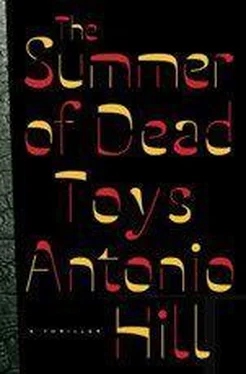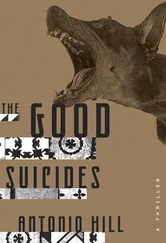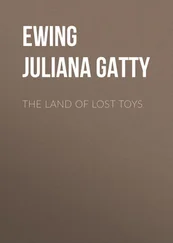Antonio Hill - The Summer of Dead Toys
Здесь есть возможность читать онлайн «Antonio Hill - The Summer of Dead Toys» весь текст электронной книги совершенно бесплатно (целиком полную версию без сокращений). В некоторых случаях можно слушать аудио, скачать через торрент в формате fb2 и присутствует краткое содержание. Жанр: Триллер, на английском языке. Описание произведения, (предисловие) а так же отзывы посетителей доступны на портале библиотеки ЛибКат.
- Название:The Summer of Dead Toys
- Автор:
- Жанр:
- Год:неизвестен
- ISBN:нет данных
- Рейтинг книги:4 / 5. Голосов: 1
-
Избранное:Добавить в избранное
- Отзывы:
-
Ваша оценка:
- 80
- 1
- 2
- 3
- 4
- 5
The Summer of Dead Toys: краткое содержание, описание и аннотация
Предлагаем к чтению аннотацию, описание, краткое содержание или предисловие (зависит от того, что написал сам автор книги «The Summer of Dead Toys»). Если вы не нашли необходимую информацию о книге — напишите в комментариях, мы постараемся отыскать её.
The Summer of Dead Toys — читать онлайн бесплатно полную книгу (весь текст) целиком
Ниже представлен текст книги, разбитый по страницам. Система сохранения места последней прочитанной страницы, позволяет с удобством читать онлайн бесплатно книгу «The Summer of Dead Toys», без необходимости каждый раз заново искать на чём Вы остановились. Поставьте закладку, и сможете в любой момент перейти на страницу, на которой закончили чтение.
Интервал:
Закладка:
“A Superman complex after a couple of lines?”
“There were no drugs in his blood. Alcohol yes, but not in great quantities. It seems he had the habit of smoking a cigarette sitting on the windowsill. Maybe he lost his balance and fell, maybe he jumped. . He was a strange boy.”
“Everyone’s strange at nineteen.”
“But they don’t fall from windows,” replied Savall. “The thing is that Marc Castells was the son of Enric Castells. That name ring a bell?”
Héctor meditated for a few seconds before answering. “Vaguely. . Business? Politics?”
“Both. He used to run his own company with over a hundred employees. Then he invested in the property market, and he was one of the few who knew to get out before the bubble burst. And recently his name has cropped up repeatedly as the possible number two of a party. There’s quite a lot of movement in the lists for the next local elections and they say new faces are needed. At the moment nothing’s confirmed, but it’s clear that a couple of right-wing parties would like to have him in their ranks.”
“Successful businessmen always sell.”
“Even more at times of crisis. Well, the case is that the boy fell, or jumped from the window. Full stop. We have nothing else.”
“But?”
“His mother won’t accept it. It was she who called just now.” Savall looked at Héctor with the friendly attitude he did so well from time to time. “She’s Castells’ ex-wife. . Bit of a murky story. Joana abandoned her husband and son when the boy was one or two years old. She only saw him again at the funeral.”
“Holy shit.”
“Yes. I knew her. Joana, I mean. Before she left. We were friends.”
“Oh yeah. The Barcelona old guard. Polo companions? I always forget how much you stand by each other.”
Savall made a disparaging gesture with his hand.
“Same everywhere. Look, like I said, officially we have nothing. I can’t put anyone on it to investigate, and I’m not so flush with inspectors that I can keep them busy with something that definitely won’t go anywhere. But. .”
“But I’m free.”
“Exactly. Just take a look at the case: speak to the parents, the kids who were at the party. Give her a definitive answer.” Savall lowered his head. “You have a son too. Joana is only asking that someone dedicate more time to the boy’s death. Please.”
Héctor didn’t know if his boss was asking a favor of him, or if he’d guessed what he intended to do and was preventing it before it happened.
Savall passed him the file with a pained smile.
“We’ll sit down with Andreu tomorrow. She opened the case with the new girl.”
“We have a new girl?”
“Yeah, I put her with Andreu. A little bit green, but on paper she’s very clever. First in all the tests, a meteoric rise. You know how the young push.”
Héctor took the file and got up.
“I’m delighted to have you back with us.” Here was the solemn moment. Savall had numerous registers. At these times, his face reminded Héctor of Robert Duvall’s. Paternal, hard, condescending, a little bit slick. “I want you to keep me posted on how it goes with that shrink.” All that was missing was a “Behave yourself,” an “I hope I don’t regret this.”
They shook hands.
“And remember.” Savall squeezed his subordinate’s hand lightly. “The Castells case is unofficial.”
Héctor let go, but the echo of the phrase stuck in his mind, like one of those bluebottles that insist on bumping their heads against the glass.
2
For the first time in days Joana Vidal felt something akin to peace. Even satisfaction, or at least relief. Someone had responded to her call, someone had assured her that they’d continue investigating until they reached a conclusive answer. “We’ll get to the bottom of it, Joana, I promise you,” Savall had assured her. And that was all she wanted, the reason she’d stayed in Barcelona, the city she’d fled and to which she’d returned to attend the funeral of a son whom, to all practical purposes, she didn’t know.
Now it was a matter of waiting, she told herself as she wandered around the high-ceilinged flat, which had been her grandmother’s and had been closed for years. Ancient-that is old-furniture, covered with sheets that in their day had been white, gave an overall ghostly air. She’d taken them off in the bedroom and dining room, but she knew that on the other side of the long wide corridor other rooms remained full of immobile, off-white shapes. Her steps led her to the balcony where a half-broken green blind was shielding a row of flowerpots containing only dry soil from the sun. She leaned out, and the midday sun made her half-close her eyes. This balcony was the border between two worlds: on one side Astúries, the heart of the barrio of Gràcia, now converted into a pedestrian street where boisterous people dressed in vivid colors-red, green, sky-blue-were walking; on the other, the flat, faded by the years, with walls once an ivory color now appearing grayish. She had only to raise the blind, allow the light to flood the interior, mix the living with the dead. But it wasn’t the time. Not yet. First she had to decide which was the place for her.
The heat made her return inside and head toward the kitchen in search of something to drink. Although she’d never been religious, she felt at peace in her grandmother’s apartment. It was her private church. In fact, at the age of fifty, it was all she could call her own. Her grandmother had left it to her when she died, against everyone else’s wishes, probably because her mind was confused and she’d forgotten in her later years that Joana had committed the ultimate sin: the one which earned her the unanimous condemnation of her whole family. She took the plastic jug from the fridge and poured herself a glass of water. “Maybe they were right,” she thought, sitting on the Formica chair with the glass in both hands; maybe there was something cruel or even unnatural in her. “Not even animals abandon their babies,” her mother had said to her, unable to control herself. “Leave your husband if you want. But the little one?”
The little one. Marc. The last time she’d seen him was sleeping in a cradle and now she was seeing him in a box of oak. And on both occasions all she’d felt was an appalling fear at her own lack of emotion. The baby she’d created and given birth to meant as little to her as the young man with very short hair, ridiculously dressed in a black suit, lying on the other side of the mortuary glass.
“Hey, you came.” She’d recognized the voice at her shoulder instantly, but it took a few seconds for her to dare to turn around.
“Fèlix told me,” she replied, almost as an excuse.
A tense silence hung in the mortuary, which shortly afterward would unleash a torrent of whispers. She’d come in without anyone paying much attention-another middle-aged woman, dressed discreetly in dark gray-but now she felt everyone’s gaze fixed on her back. Surprise, curiosity, reproach. The sudden leading lady in a funeral that wasn’t hers.
“Enric.” Another male voice, Fèlix’s, which gave her the required strength to face the man before her, one step too close, invading that space one wishes to keep free.
“I wanted to see him,” she said simply. “I’m going.”
Enric looked at her with surprise, but moved aside as if inviting her to leave. The same expression she’d read on his face the last time she saw him, six months after leaving, when he came to Paris to ask her to return home. There were more wrinkles around those eyes, but the mix of incredulity and disdain was the same. Both times Joana asked herself how he could look so immaculate: well shaved, suit without a wrinkle, the knot in his tie perfect, his shoes shining. An irreproachable appearance that aroused an instinctive aversion in her.
Читать дальшеИнтервал:
Закладка:
Похожие книги на «The Summer of Dead Toys»
Представляем Вашему вниманию похожие книги на «The Summer of Dead Toys» списком для выбора. Мы отобрали схожую по названию и смыслу литературу в надежде предоставить читателям больше вариантов отыскать новые, интересные, ещё непрочитанные произведения.
Обсуждение, отзывы о книге «The Summer of Dead Toys» и просто собственные мнения читателей. Оставьте ваши комментарии, напишите, что Вы думаете о произведении, его смысле или главных героях. Укажите что конкретно понравилось, а что нет, и почему Вы так считаете.












